

montessori MESSENGER

Woodland Hill Montessori School

A
Gentle Return: Embracing the Montessori Phase-In Process
Our students have returned to campus, and exuberance is in the air. The best part of our school is the children, and as they return to their classrooms, a familiar hum fills the air. Like bees in a hive or birds in formation, they move with purpose; exploring their cubbies, shelves, and the expansive outdoor spaces. Each child is engaged in their individual work—focused, joyful, and relieved as they complete each task. Yet, they also come together for a shared goal: contributing not just to their classroom community, but to the world beyond.
At Woodland Hill, we embrace the start of the school year with thoughtful intention. The Phase-In process ensures that new and returning students adjust to their environments in a way that supports their development and transitions. This gradual introduction to the classroom is designed with care by teachers who meticulously prepare the environment to meet every child where they are. It readies the students to have a balanced and successful transition. With open hearts and watchful eyes, the teachers are ready to support each child’s unique journey.
In Montessori, we hold two truths in balance: while we design a plan for each child's upcoming needs, developments, and milestones, we also “leave space for the unexpected, knowing that every child is unexpected”. (McTamaney, 2007) This is the heart of our Montessori method, and we’re grateful to witness it in action as the new year unfolds.






All School Photo
On the morning of Friday, September 27, our entire school community came together in the amphitheater for the annual All School Photo. It was a special moment to unite in one space. Michelle led the students in a meaningful conversation about the importance of peace and how we can show kindness to those around us. Each level contributed by sharing a poem or song about peace, creating a heartwarming atmosphere. It was truly a beautiful morning on campus!



Toddler

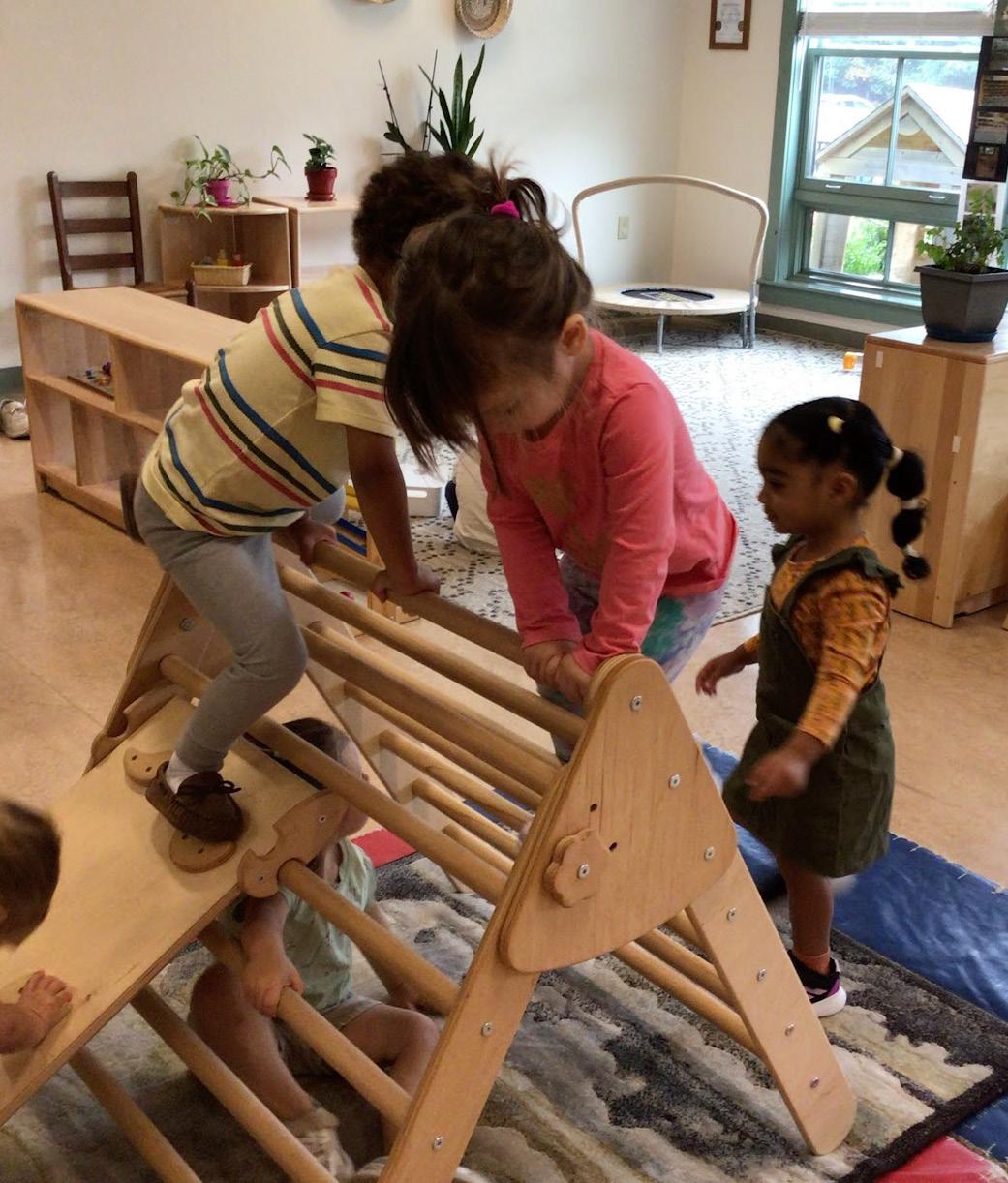
The toddler class has officially transitioned, and the children are settling into their routines. While there’s still a little crying, the teachers are working hard to establish ground rules and structure. The classroom’s gross motor area, complete with a slide, Pikler triangle, and sit-and-spin, is helping channel their energy. On the playground, the classroom is focusing on safe boundaires as some of our adventurous toddlers are eager to explore the woods.



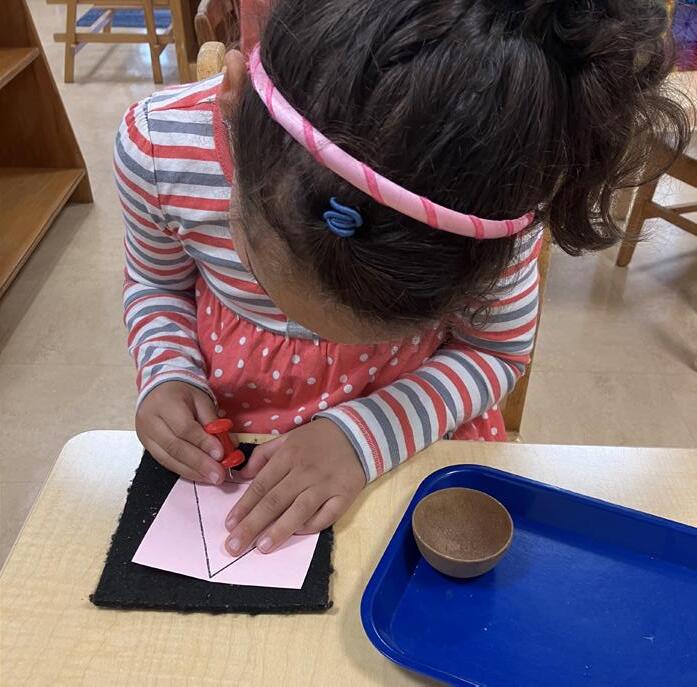

The Primary team happily welcomed our new students to and those returning to the classroom. The focus has been on establishing daily routines and introducing key concepts like large number building, rhyming, segmenting, matching, and land, air, and water. The new playground equipment has been a hit, and back-to-school night was a wonderful success. We look forward to watching the children build confidence in these foundational works as they progress to new challenges!


a n d i n s p i r a t i o n !

W H A T T O E X P E C T

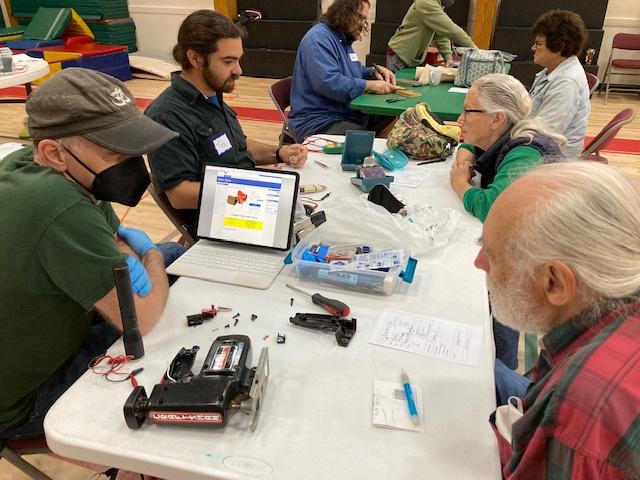
A n a t m o s p h e r e o f c o l l a b o r a t i v e
e d u c a t i o n o n s u s t a i n a b i l i t y & r e p a i r
c u l t u r e
E l e c t r o n i c s r e p a i r
S m a l l a p p l i a n c e r e p a i r
T e x t i l e a n d c l o t h i n g r e p a i r
F u r n i t u r e r e p a i r
Fun and educational for the whole family! C O S T
E l e c t r i c a l r e p a i r
B i c y c l e r e p a i r
L i g h t r e f r e s h m e n t s
K n i f e s h a r p e n i n g




W H E R E
Woodland Hill Montessori School 100 Montessori Place North Greenbush, NY 12144
W H E N
Saturday, November 2, 2024 10 am - 2 pm
Voluntary contributions welcomed





Lower Elementary
In Lower El, the students have started the study of North America, including the First peoples of the Americas and tons of animal research. The children have been or will shortly be presented the First Great Lesson and begin their search for their cosmic purpose and study of our physical world through the science experiments are on the shelf. The classes are starting their work of fractions and grammar, as the children get back into the routine.



The Upper Elementary has welcomed our new 4th graders and is off to a great start! We have spent time building community, playing games and discussing our rights and responsibilities. We created an Upper El shared agreement that was inclusive of all three classrooms and executed by our 6th year students. This year we are calling it our Upper Elementary Constitution.
The cultural cycle this year will revolve around botany, physical sciences and history. Michele has begun with vital functions of living things, Kim is presenting the beginning of the universe and Astronomy, and J.T. is introducing Paleo American history. Our field trips we are planning, still to be definitive: flying deer to come visit us here on campus and we will take a trip to the Iroquois museum. Our 5th graders are underway on their autobiographies and our 6th graders have begun working with Alisa and Sarah on their Senior Capstone Projects. We are looking forward to the next few weeks as we continue to settle into our routines. We have some fun fall activities planned and we are looking forward to an exciting year.
Upper Elementary
Middle School

We kicked off the year with an amazing two-day adventure at Camp Chingachgook on the stunning shores of Lake George! Ourstudents embraced the opportunity to challenge themselvesthrough activities like archery, hiking, team-building games, ahigh ropes course, swimming, and even war canoes!But the fun didn’t stop there. As the sun set, we gathered arounda campfire, singing songs and sharing stories, forming bonds thatwill carry us through the school year. Students not only tested their limits but also discovered their leadership potential andbuilt lasting friendships.
It was an unforgettable experience filled with teamwork, laughter,and plenty of personal growth. We’re excited to see how thesenew skills and relationships shape our journey ahead!
Hear from the students in Middle School on updates of different curriculum areas and studies.
“In 7th Grade Math, we are learning about fractions and reducing them. We are also converting decimals to fractions. We’re also converting improper fractions to mixed numbers and also the other way around. Some questions ask us ‘real world’ problems, so we need to find out if we need to add or subtract or multiply.” -Max M.
“In 8th Grade Math, we are classifying real numbers and finding the simplest radical form. We started learning about imaginary numbers like the square root of negative 25! We had a mastery check about classifying real numbers and square roots, and it was awesome because it proved that I worked really hard and it paid off.” -Liam H.


“In ELA, we are reading a book called Look Both Ways. We have to read the first chapter and then do two assignments that go along with it: Vocabulary and a reading comprehension sheet. So far, I like the book. But the first chapter is kinda nasty because it talks about boogers! We also just finished up our 6 word memoirs. Every one that I’ve heard so far have been really good and they’ve have a lot of meaning.” -Evy B.

“In Science, we have been doing Choice Work. I did a brochure about sedimentary, metamorphic, and igneous rocks on Tuesday, and then I did a Venn Diagram about the different rocks about what makes them unique and similar on Thursday. We identified rocks, which was really fun because it was like a guessing game, but we also got to implement what we were learning in class!” -Maila A

Montessori
Tuesday, October 1 | 7 p.m. Join us on
The Montessori method and its principles are not just for your child’s time at school. They can also be applied at home to help children continue cultivating independence, confidence, and a lifelong love of learning. Join Jennifer Graham, a long-time teacher at WHMS, for our upcoming Parent Education evening on Montessori in the Home. Jennifer will offer practical tips on how to create a more "Montessori" environment at home, including:
Encouraging your child to be a helpful member of the family
Engaging Montessori-inspired activities at home
Fun family activities that foster learning and collaboration
Meeting ID: 928 8322 7052
Passcode: Home


Nurturing the Brain and Shaping Future Minds
By Michelle Edwards
I became a Montessori educator in 2007 after many years of teaching in traditional educational settings. I was drawn to learn more about Montessori philosophy and practice not because of exposure while obtaining a teaching degree but because of my experience with children who had attended Montessori schools. There was something beautifully different about these children, something subtle but important.
In June of that year, I headed to the College of New Rochelle, leaving my two- and five-year-old children behind to embark on a six-week immersive experience commonly referred to as Montessori training. This changed my life, both as a parent and a professional. I had the gift of studying under Ginny Varga, who, already in her 70s at the time, was the most dynamic and impactful educator I had met. To my surprise, Ginny did not lead with a list of lessons to give or materials to obtain. Instead, we learned about the brain of a developing human. My peers and I came to understand that the art of Montessori practice is much deeper than knowing how; it is essential to know why. Understanding how experiences in the environment impact neurological development is at the foundation of the Montessori Method.
In the years to follow, I have been immersed in Montessori schools, surrounded by children and teens in the process of self-creation. I have observed the measurable outcomes: substantial academic achievement, a love of learning and an intrinsic thirst for knowledge, persistence and resilience, and an aptitude for compassionate leadership, to name a few. Thanks to new and ongoing research, we can now complement the observable behavioral data with scientific data showing the effects of Montessori education on underlying brain network development. I invite you to learn more by reading this article recently published in the npj Science of Learning Journal: Differences in spatiotemporal brain network dynamics of Montessori and traditionally schooled students.
The research provides further evidence of the impact of Montessori education. It goes beyond the individual with far-reaching potential to affect societal change.

“We face numerous challenges that require innovative mindsets to address them effectively. How can we adopt new perspectives? As Einstein wisely stated, “We cannot solve our problems with the same thinking we used when we created them.” Shaping new mindsets is essential, and education offers a promising means to achieve this. Early life experiences significantly influence our thinking and adaptability later in life, largely due to experiencedependent neural plasticity. Consequently, pedagogy holds the potential to facilitate lasting societal changes. While many studies have examined the impact of pedagogy on behavioral outcomes, there has been comparatively less focus on its effects on underlying brain dynamics.” 1

It is with much hope and conviction that I continue my journey as a Montessorian alongside the dedicated professionals at Woodland Hill. I am grateful for the families who have entrusted us with the care and keeping of their children, and I am confident in their potential to lead us to a better tomorrow.
1. Zanchi, P., Mullier, E., Fornari, E., Ledoux, J., Beaty, R., Hagmann, P., & Denervaud, S. (2024). Differences in spatiotemporal brain network dynamics of Montessori and traditionally schooled students. Npj Science of Learning, 9(1), 1-10. https://doi.org/10.1038/s41539-024-00254-6



IINDEPENDENT NDEPENDENT HIGH SCHOOL FAIR HIGH SCHOOL FAIR
Wednesday, October 9 | 6 p.m. - 7:30 p.m.
I n t e r e s t e d i n e x p l o r i n g i n d e p e n d e n t h i g h
s c h o o l a s a n o p t i o n f o r y o u r f a m i l y ? T h i s
i n f o r m a t i o n s e s s i o n w i l l g i v e y o u a n
o v e r v i e w o f o p t i o n s , g u i d e y o u i n a s s e s s i n g
t h e r i g h t f i t , a n d s h a r e a t i m e l i n e f o r
a p p l y i n g . A d m i s s i o n s r e p r e s e n t a t i v e s f r o m
a r e a i n d e p e n d e n t s c h o o l s w i l l b e a v a i l a b l e
t o a n s w e r y o u r q u e s t i o n s a b o u t a d m i s s i o n s
a n d f i n a n c i a l a i d .
E R A E N A F R A I T E S - G O N Z A L E Z
D i r e c t o r o f A d m i s s i o n s
e f r a i t e s @ w o o d l a n d h i l l . o r g
Academy of the Holy Names
Albany Academy
Bard Academy at Simon’s Rock
Buxton School
Christian Brothers Academy
Darrow School
Doane Stuart
Emma Willard
Hoosac School
LaSalle Institute
Miss Hall’s School
STEM High School
Tech Valley






Our students are loving the new additions to the playground this year! Thanks to the funds raised at last year's Woodland Hill Soiree, we’ve installed five exciting new pieces on both the upper and lower school playgrounds. From tire swings and a spiderweb climber to the student-powered Saturn 4 swing and the Supernova moving track, it’s been a joy to see our students fully engaged and having fun outdoors!

New Faces at Woodland Hill
Meet our newest faculty at WHMS this school year!

Amanda Hunte
Toddler Assistant Teacher
Amanda was an assistant teacher at The Montessori Soho. She is currently enrolled in an Association Montessori Internationale (AMI) training program with the Montessori Training Center Northeast. Along with her professional qualifications, Amanda brings a warm and gentle disposition and a reverence for the work of the child.
Lynnettee Ramos
Primary Assistant Teacher
Lynnette has worked as a Lead Teacher at progressive schools in both New York City and Shenzhen, China. Her warmth and deep respect for the personhood of our youngest students are a natural fit for working with the youngest of our students.

Lilli Worden
Primary Lead Teacher
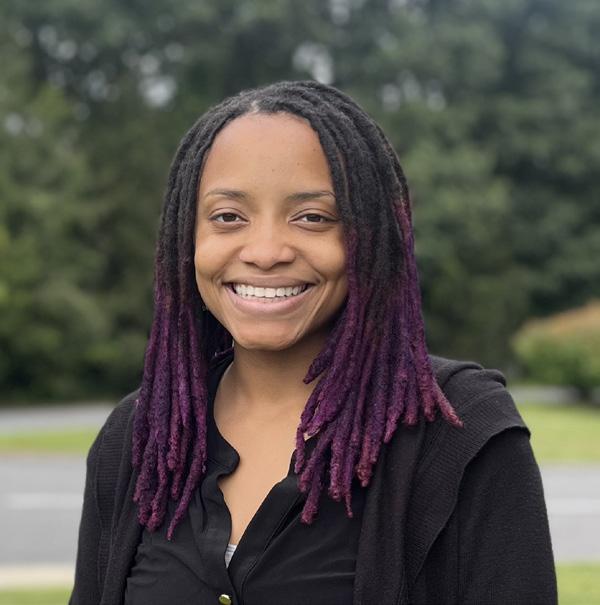
Lilli Worden has a bachelor’s degree in elementary education from the University of Vermont. Prior to WHMS, she served as a lead Montessori teacher since 2022. She is certified by the American Montessori Society in Early Childhood Education and completed her training at the West Side Montessori Teacher Education program.
Julius Hunte
Lower Elementary Assistant Teacher
Julius has a bachelor's degree in Sociology from Queens College which included coursework in Elementary Math, Early Development in Language and Literature, and Elementary Music Education. Julius previously worked as a literacy tutor while residing in New York City.


V O Y A G E O F V O Y A G E O F
Discovery Discovery
M A T H E M A T I C S

Step into your child’s shoes and spend a morning learning the Montessori way! Join faculty from each level as you travel through the Voyage of Discovery exploring Dr. Montessori’s math
Lunch Provid
Childcare Avail
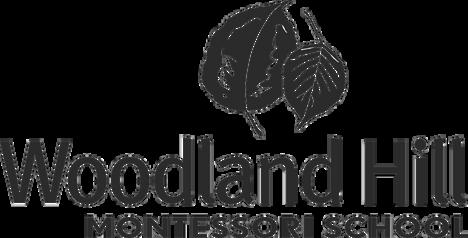
Parent Education
Contact Eraena fo information


